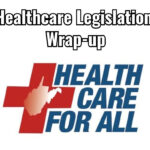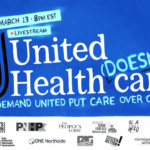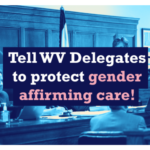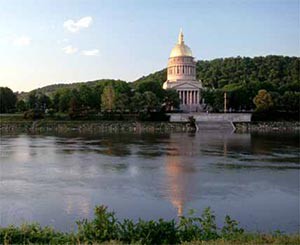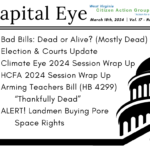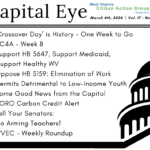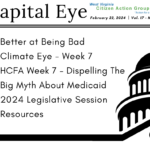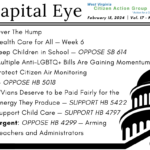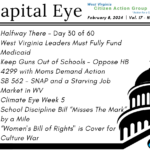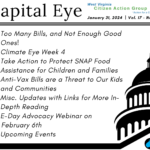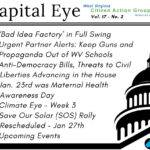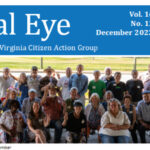- Like
- Digg
- Del
- Tumblr
- VKontakte
- Buffer
- Love This
- Odnoklassniki
- Meneame
- Blogger
- Amazon
- Yahoo Mail
- Gmail
- AOL
- Newsvine
- HackerNews
- Evernote
- MySpace
- Mail.ru
- Viadeo
- Line
- Comments
- Yummly
- SMS
- Viber
- Telegram
- Subscribe
- Skype
- Facebook Messenger
- Kakao
- LiveJournal
- Yammer
- Edgar
- Fintel
- Mix
- Instapaper
- Copy Link
 |
|
|||||||||
Twenty-Four Down, Thirty-Six to Go by Gary Zuckett Friday was the 24th day of the session. Over one thousand bills have been introduced by both the House and the Senate. More come out each day. Thankfully most will end up in the recycling bin. Now if we just had a functioning recycling center in our capital city, there would be somewhere locally to haul them. Flushing Water Protections The expected attack on last year’s water protection bill (SB373) came out in both houses this week – SB 423 & HB 2574. What wasn’t expected was the ferocity of the attack. See Karan’s article for the details on this and other sneak attacks on our water quality protections. WV-CAG, enviromental and civic groups are planning a Monday press conference on this outrage. Obamacare “Kill” Bill on Hold for Now HB 2216 repeals the duties and composition of our State Insurance Exchange Board authorized last year but as yet to be appointed by the governor. It also prohibits West Virginia from switching to such a state-operated exchange without additional legislative action. Right now West Virginia is in a partnership type exchange with the federal government. This is currently working out but could be upended by a pending Supreme Court ruling on whether Affordable Care Act (ACA) insurance subsidies can be funneled through these state-federal partnerships as Congress intended. What’s at stake is the estimated $61 million in tax credits collected by West Virginians getting health care insurance through the ACA. If the court blocks the current method for subsidies, there would be only a few months to set up a new state-based exchange. But if this bill passess, the Legislature would have to act quickly in a special session to approve such a retooling. Yeah, right. Call your lawmakers and tell them to vote no on this two-faced bill. HB 2216 has already passed Health Committee and is parked in House Judiciary for now. It’ll be interesting to see if the new leadership really wants to block affordable insurance for thousands of West Virginians. Watch our alerts for details on a future public hearing this one. Repeal of Energy Portfolio a “Model” for Other States? An insightful Associated Press writer caught our attention with his article in last Sunday’s Gazette/Mail. Reporter Jonathan Mattise cites national climate denier groups, such as the Heartland Institute, singing the praises of our state’s repeal last week of the do-nothing Alternative and Renewable Energy Portfolio Standard via HB 2001. These groups are holding up the bill as a “model” for other states to follow. This could result in some actual collateral damage. Hey, other states, keep your energy portfolios intact! With the exception of net metering, ours wasn’t worth saving. Link to Mattise article found all the way out in the Idaho Statesman. Dark Money Planning for Next WV Election The Edgewood Country Club was the host for an exclusive soiree whose contributors to a $1,000 per person reception and $25,000 a plate dinner were promised total anonymity from disclosure. The topic of the gathering was to gloat over the “successes” of the past election and plan for the next. Read this revealing article and click on the embedded link to the actual “invitation,” which reads like a legal contract. Push for Convention Continues SCR 21 appeared this week, another resolution calling for a full-blown constitutional convention of the states. When enough states pass this type of resolution, Congress is locked into setting one up. This is an extremely scary scenario. If such a convention is convened, all cards are on the table and we could come out the other end with a totally re-written Constitution! Don’t let West Virginia enable this sneaky attempt by radical conservatives to hijack our Constitution. Contact your Delegates and Senators and let them know you don’t want a convention – that we should continue to amend our founding document issue-by-issue as it has been done since the beginning. Labor and Environmental Groups Agree At a Thursday public hearing, the United Mine Workers of America (UMWA), Sierra Club and WV Environmental Council all testified against HB 2566/SB 357, the so-called “Coal Jobs and Safety Act of 2015,” a terrible bill being pushed by the WV Coal Association. This industry wish list should more accurately be called the “Blankenship Miner Injury and Pollution Promotion Act” as its sole purpose seems to be to mine coal cheaper and faster by cutting safety corners underground and relaxing water quality standards above ground. Both bills are moving in their respective chambers. Drinking Water Protections Under Attack by Karan Ireland Just over one year after the Freedom Industries’ chemical leak that contaminated the water of 300,000 people, the West Virginia State Legislature has introduced several pieces of legislation that would weaken existing water protections and leave us more vulnerable to events like the Elk River disaster. The most remarkable of these bills are HB 2574 and its companion, SB 423, which effectively gut SB 373, the bill passed last year to address threats to public drinking water supplies. Unbelievably, the leaky Freedom tank itself would be exempt from regulation under this proposed legislation! An addendum to a report released in January by Downstream Strategies and the West Virginia Rivers Coalition highlights the major differences between the new, proposed legislation and SB 373. Impacts of the proposed legislation include:
Though a compromise, SB 373 is a strong piece of legislation; one that became stronger as it moved through the legislature because of continuous public input. Citizens’ groups were at first snubbed by the Governor’s office for its initial stakeholder meeting on a legislative response to the leak, but reached out to the people of West Virginia and encouraged them to take their own, rightful place at the table. The citizens responded, turning out in droves for rallies, town halls, and public hearings. Many made calls and sent letters to legislators, calling upon their representatives to take out amendments that would exempt any industry from compliance or otherwise weaken the bill. Even after the bill was passed, people responded at each opportunity offering comments to DEP as it went through the rules process. Despite pressure from industry and some legislators calling for a special session over the summer, the DEP worked to create a risk-based assessment of the tanks that would ease requirements on tanks that posed less of a threat to our water. Tanks were divided into three “levels,” keeping Level 1 tanks to a higher standard of inspections due to their location, contents, and/or size, but allowing Level 3 tanks to be excluded from the act after initial registration. These measures were taken specifically to address concerns that the Act was onerous and burdensome to small operators with tanks located in “East Sweet Jesus, West Virginia,” to quote one industry lobbyist. Neither HB 2574 nor SB 423 take into account these accommodations made by the DEP rule. So, now here we are: back to square one. Oh, but wait – there’s more! Other legislation introduced this session would actually increase the vulnerability of our water supply. For example, SB 357 / HB 2566 – “Coal Jobs and Safety Act” (as well as rules bill HB 2290) relieve coal companies from meeting water quality standards in their pollution permits and drastically weaken the aluminum water quality standard. There’s also HB 2269 – requiring rules of the DEP be no more stringent than corresponding federal laws? And, don’t forget HB 2593, the purpose of which is to declare the Environmental Protection Agency and the Army Corps of Engineers’ proposed rule defining the “waters of the United States” unenforceable in the State of West Virginia. Of course, that bill wouldn’t matter if our state Senate had its way. It has introduced SCR 8, urging the US EPA to withdraw and/or rescind its proposed definition of “waters of the United States”. With so much change happening at the Capitol, we hope that this 82nd Legislature, in its eagerness to get down to business, has simply misunderstood some of the dangerous implications of these bills. With your help and engagement, we will encourage them to meet with environmental and citizens’ groups, to hold public hearings, and to reevaluate running bills that jeopardize our most precious natural resource. Members of the WV Safe Water Roundtable are organizing a press conference to bring voice to our shared water concerns. We need you present to show that “Water Unites Us”! When: Monday, February 9 at 10am Tell your legislators to reject these bills that go to extremes to gut water protections. Moving Toward Improving Recycling in the Mountain State by Emmett Pepper Recycling in West Virginia is challenging and complicated. To encourage people responsibly dealing with their waste, we want to push people toward recycling from just landfilling waste, but we have to be careful not to push people toward unlawfully disposing of trash on our hillsides. Those in the Kanawha Valley have been living a nightmare scenario for several years now, with low recycling rates, a failed privatization attempt, and much finger-pointing on all sides. One of the myriad problems in Kanawha County and elsewhere in the state is that it is very difficult to have options for recycling, due to laws regulating waste hauling that discourage competition. These laws may make sense for hauling trash, because they essentially give a monopoly to a waste hauler, but require them to service rural and more profitable urban areas. But recycling is inherently different, and in some parts of the state it is nearly impossible to find someone who can cost-effectively pick up your recycling due to smaller profit margins for recyclers. For instance, in Kanawha County, it costs close to $200/month for businesses to have their recyclables picked up by Waste Management, on top of their trash removal fees. CAG, along with partners at the WV Sustainable Business Council, has been working with recycling experts in order to increase competition in recycling in the state. The major stumbling block to getting recycling competition is the “certificate of necessity and convenience” otherwise known as the “certificate of need.” This certificate is granted by the Public Service Commission and is required of any motor vehicle carrier, from taxis to trash (and recycling) trucks in order to transport using a car or truck. The first attempt at dealing with the issue is SB 352, introduced by Senator Chris Walters (R – Kanawha). Senator Walters’ bill would allow local solid waste authorities to give exemptions for waste haulers in certain circumstances. There continue to be discussions about how to best improve competition for recycling in the state, so stay tuned on the latest. In the meantime, contact your Delegate(s) and Senators, as well as House and Senate leadership. Let them know:
Hon. Tim Armstead Hon. Daryl Cowles Hon. Bill Cole Hon. Mitch Carmichael You can find your Delegate(s) and Senators here. 20 Week Abortion Ban is Back and Moving Quickly by Jessica Steinrueck Hello, I am Jessica Steinrueck, a new intern at Citizen Action Group. As a current student at Antioch College, I am spending three months, my winter work quarter, with both Citizen Action Group and People Concerned about Chemical Safety. This work is new to me, but in line with my proposed self design major which combines Political Economy and Environmental Science. I arrived just in time for the legislative session and all of the excitement and work that comes along with it, especially this year! Just yesterday, I went from a public hearing on the Creating Coal Jobs and Safety Act (Senate Bill 357) to a public hearing on the Pain-Capable Unborn Child Protection Act (House Bill 2568). HB 2568 is the 2015 version of last year’s 20 week abortion ban. Last year, it passed both the House and Senate but was vetoed by Governor Tomblin who was advised that it was unconstitutional. This year, we are facing the bill again, with much slimmer chances of reaching a similar outcome. The bill would ban abortions when the gestational age of the fetus reaches twenty weeks, which is generally twenty two weeks after the woman’s last menstrual period. There may be exceptions if an abortion is needed to “avert her death or to avert serious risk of substantial and irreversible physical impairment of a major bodily function”. There would not, however, be an exception made for women who a physician believes may commit suicide. Approximately thirty people spoke out against the bill at the public hearing, with just ten people speaking for it. Doctors, physicians, faith-leaders, women and men spoke out against the bill. I learned that a twenty-week fetus has primitive reflexes such as sucking and recoiling, but that there is no evidence that it experiences pain. I also learned that the fetus is aborted by simply inducing labor, which is no more painful than what you and I have experienced. I heard many stories from women about when abortion was right and necessary for them. Despite overwhelming opposition to the bill from the public, HB 2568 passed in the House Health and Human Resources Committee yesterday and the bill is now being fast-tracked through the House Judiciary Committee. Follow the link below to read a fact sheet on the bill and more, from WV FREE: http://www.wvfree.org/advocacy-2/action-alerts/ Bills for Non-Partisan Judicial Elections Lead to Debate on Virtues of Public Financing by Julie Archer While the process of electing judges is not without flaws, we have not seen a reason within our Clean Elections coalition to promote a wholesale change in the way we select judges. Unfortunately, West Virginia has seen first-hand the way that big spending by candidates and independent groups can skew elections at all levels of state government, including the WV Supreme Court of Appeals. However, given the pervasiveness of special interest money in Supreme Court elections, we have taken the position that public financing is a better solution and does more to free candidates from the public perception that they may be influenced by the money they receive from lawyers and other interests that come before the court. For many years, bills to make the switch from partisan to non-partisan elections have been introduced every legislative session. While Democrats controlled the legislature, these proposals failed to gain any traction. Under the new Republican leadership, however, both the House and Senate Judiciary Committees began discussing bills (HB 2010 and SB 10) last week to elect all justices to the WV Supreme Court of Appeals, all circuit court judges, all family court judges and all magistrates on a non-partisan basis. Because the bills required making some revisions to the Supreme Court of Appeals of the Public Campaign Financing Program, which was used successfully by Justice Allen Loughry in the 2012 election and made permanent by the legislature the following year, we were watching closely to see how these changes might affect the program. In the House Judiciary Committee, and later on the floor, Delegate Tim Manchin offered an amendment to HB 2010 to make public financing available to candidates for circuit court. Both times, Delegate Manchin spoke eloquently in favor of the amendment, reminding his colleagues that our current public financing program was established after the state was “nationally humiliated” by State Supreme Court Justice Brent Benjamin’s failure to remove himself from cases involving Massey Energy, after Massey CEO Don Blankenship spent more than $3 million on an independent expenditure campaign that benefited Benjamin, and arguing that expanding the program furthered the goal of the non-partisan bill by removing “the greatest threat to impartiality there is,” he said in reference to campaign contributions. Unfortunately, the amendment was not adopted but we greatly appreciate Delegate Manchin’s strong stand for a fair and impartial judiciary and keeping special interest money out of the courtroom, and the discussion the amendment helped facilitate regarding the future of public financing in West Virginia. In case you missed it:
Stay tuned as the debate moves to the Senate. Monday, February 9 at 9AM House Chamber – Public Hearing on SB 6, Relating to Medical Professional Liability. For more on this issue, read this statement from the WV Association for Justice. Monday, February 9 at 10 AM, McManus Room (252-M), State Capitol – WV Safe Drinking Water Roundtable and affiliated groups Press Conference about a number of bills that propose to weaken water protections . Tuesday, February 10 at 10 AM Governor’s Press Conference Room, State Capitol – Press Conference with Communications Workers of America (CWA), Local 2055 members from the Division of Corrections, Regional Jails and the Division of Juvenile Services on pay, workplace safety and other issues pertaining to their jobs. Monday, February 16 (Presidents’ Day) at noon, State Capitol steps, south (river) side – “Show up and Stand up” Day – It’s time for hardworking West Virginians to come directly to the Capitol and stand up to the WV GOP’s attack on our hardworking West Virginia families!
Wednesday, February 18, 9:00 AM to 3:00 PM in State Capitol, lower rotunda – E-Day There will be a press conference at noon, lots of cool displays to look at, and guidance available for citizen lobbying. Go here to invite your friends on Facebook! That evening the WV Environmental Council’s annual awards dinner/fundraiser will be held at the Charleston Woman’s Club, 1600 Virginia Street East at 6 PM. Suggested donation is $15. For more information contact Marium Bria: mariumbria@gmail.com or 304.807.5873. |
||||||||||
|
From the CAG Action Alert E-mail List |
||||||||||

